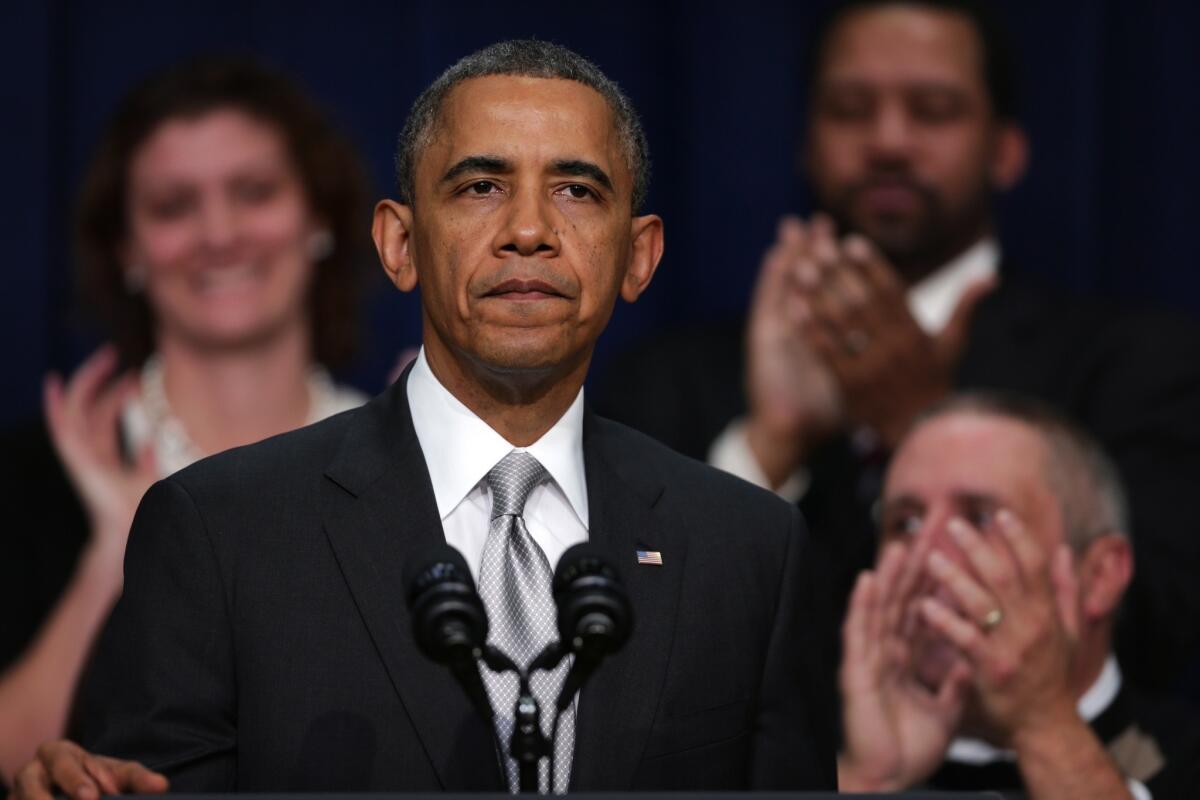For Obama, it’s all about Obamacare

President Obama’s speech Tuesday announced the relaunch of his healthcare program’s website. But he was also aiming to relaunch his entire second term, which has careened from high ambition to near-catastrophe in less than 11 months.
Until his signature healthcare program is running smoothly, Obama stands little chance of focusing Congress on any of the other goals of his once-ambitious second-term agenda, including immigration reform and addressing the nation’s infrastructure needs.
Republicans are already building their 2014 congressional election campaign around Obamacare, and if they’re able to win the Senate and hold on to the House, Obama will be a very lame duck for his last two years in office.
PHOTO ESSAY: Obamacare -- and 8 other bungled launches
With so much at stake, the speech wasn’t all that reassuring. The president asserted that the law was already working (a statement unlikely to convince most Americans), but he acknowledged that more problems could arise. “We’ve learned not to make wild promises,” he said. “Whatever comes up, we’re going to fix it.”
In the appearance Tuesday, Obama embraced a strategy that has worked for him in the past: a direct appeal to the American people. But speeches aren’t going to fix the “back end” of the HealthCare.gov website, which is still transmitting unreliable information about enrollees to the insurance companies providing their policies. The Department of Health and Human Services still refuses to disclose the system’s error rate — not a good sign.
Even in the best of times, Obama’s speeches don’t have the impact they once did. Tuesday’s event was carried live by only one major cable channel, MSNBC; CNN and Fox News didn’t bother.
YEAR IN REVIEW: Washington’s 5 biggest ‘fails’ of 2013
The only way to make Obamacare look like a success is for the president to make it work. But that will take smarter, better management of a complex set of projects that sprawl across both the government and the private sector — a talent that hasn’t been abundant in Obama’s staff so far.
In the president’s first term, his White House was staffed mostly with policy wonks who designed his economic stimulus and healthcare legislation, plus campaign aides who prepared him for his 2012 reelection. But what he needed to launch Obamacare was a brilliant CEO.
The White House was warned in 2010 (by Harvard professor David Cutler among others) that it needed a strong, independent manager to run the implementation of Obamacare, but the advice was ignored.
YEAR IN REVIEW: Highs and lows from Obama’s roller-coaster year
That lesson has finally been learned — belatedly. In October, as the website debacle became clear, Obama asked Jeffrey Zients, his new top economic advisor, to take charge of the rescue operation. Next year, Zients is scheduled to get his original job back, and the White House plans to install a new Obamacare CEO — an executive who will hold the president’s future in his hands.
Some administration officials say they expect Kathleen Sebelius, who oversaw the bungled rollout as secretary of Health and Human Services, to resign by the end of the year. She wasn’t the only person who failed to notice the oncoming disaster. But in the eyes of some aides, her presence will serve as a continuing reminder of the administration’s failure.
“If this were to happen in the private sector,” Obama’s former spokesman, Robert Gibbs, said on NBC last month, “somebody would have probably already lost their job.”
But the real test of how much Obama has learned will be in the other staff changes he makes. His chief of staff, Denis McDonough, has won praise from members of Congress and was one of the voices calling for closer management of the Obamacare rollout. He appears likely to stay. But it would make sense for Obama to add more management experience to his staff.
Will he be able to pull it out? It’s possible. There are plenty of examples of presidents getting into trouble, revamping their staffs and recovering their momentum. Ronald Reagan watched his credibility collapse in the Iran-Contra scandal of 1986, but then he hired former Sen. Howard H. Baker Jr. as chief of staff, focused his energies on ending the Cold War and salvaged the end of his second term. Bill Clinton’s crisis came in his first term, after his own healthcare legislation failed; he remade his entire White House staff, eased out a few Cabinet officers and recovered to win reelection.
Obama will need to study the lessons of his predecessors. Bringing in new blood could help show that the president is serious about correcting what went wrong. And when domestic politics are at a standstill, a second-term president can improve his stature by plunging into foreign affairs; Obama has plenty of opportunities on that score.
The first item on his agenda, though, has to be making sure Obamacare is working. If it’s not, nothing else will matter.
Twitter: @DoyleMcManus
More to Read
A cure for the common opinion
Get thought-provoking perspectives with our weekly newsletter.
You may occasionally receive promotional content from the Los Angeles Times.











